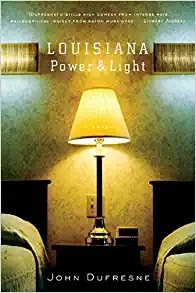John Dufresne is the author of the new book Storyville!: An Illustrated Guide to Writing Fiction. His many other books include the novel Louisiana Power & Light and the writing guide The Lie That Tells a Truth. He teaches in Florida International University's MFA program.
Q: You've written a variety of writing guides--how did you
come up with the idea for Storyville!?
A: Because I teach fiction writing, I am always thinking
about it—how does it work? how might it stumble?
Then I was asked to do a TED Talk, and I thought I’ll tell
the world how to write a story in 17 minutes. My first draft went 35 minutes.
They said, 17. And I had to memorize it, so 17 was good. But I had all these
other ideas, so I just kept going.
Q: You begin the book by stating, "You need at least
two skills to be a fiction writer. You have to be able to write and you have to
be able to tell a story. Telling a story is the harder skill to master."
Why do you think that's the case?
A: You must have a love of words and you must the music they
make when they gather in sentences. Words are all we have, after all.
But, no matter how luminous your prose or how fascinating
your characters, if you have no plot—no narrative shape—if the characters have
nothing meaningful to accomplish, the reader will put down your story.
Plot is the gravity that holds the world of your story
together. It’s your weapon of suspense. Wield it wisely, and the reader will
want to know what happens next. That’s storytelling, what Chaucer called the
craft so long to learn. Plot is the architecture of action.
The reader says, tell me a story. She does not say, show me
how clever you are. The reader wants to know why the characters do what they do
and tell me about me. The reader wants to be moved by a character’s struggle,
not to be impressed by a writer’s adverb. (But, of course, you can do both.)
Aristotle told us that plots proceed through a series of
reversals (a character tries to get what she wants and makes it worse) and
recognitions, (a change from ignorance to knowledge).
The basic plot of every story is (and I’m paraphrasing John
Gardner here): a central character wants something intensely, goes after it,
and as a result of a struggle comes to a win or a loss.
You take this definition of the basic plot and see how you
might let the necessary plot do your thinking for you and lead you quite
naturally to considerations of characterization, theme, tone, point of view,
setting, and so on. and how you might, in so doing, create the emotional and
intellectual experience our reader hopes for.
Don’t make the plot happen, let it happen.
Q: What do you think Evan Wondolowski's illustrations add to
the book?
A: Besides being fun to look at and arresting to the eye,
Evan’s illustrations help make some complex ideas complex ideas more accessible
and understandable. They are especially helpful to those visual thinkers, like
me, who find it easier to grasp what is seen rather than what is printed.
I really love all the fun he had with turning the text into
art and organizing some of those long lists I have into comprehensible units.
Q: Who do you see as the readership for the book, and what
do you hope they take away from it?
A: I think anyone who is interested in telling a story will
find the book helpful. More specifically, I had in mind the people who don’t
get the opportunity to study fiction writing at a university or in a workshop
setting.
This is a book that slows down the writing process, takes
you step by step through the writing of a story, demystifies what is really not
so mysterious at all. Writing is work. And you need the right tools in your kit
before you begin the job.
Q: What are you working on now?
A: My big project is a novel I’ve been writing for a few
years. I’ve just gotten notes from my editor, my agent, my writing pal Deborah
Monroe, and I’m plunging into revision.
I also have a couple
of long stories that might grow into novellas or novels and a book of stories
pretty much together. And I’m always writing flash fiction.
Q: Anything else we should know?
A: Just how much I appreciate your doing this. April in the
tine of coronavirus was an unfortunate time to launch a book. Had to cancel my
readings and talks.
--Interview with Deborah Kalb




Got the book and am enjoying it thoroughly. Scott Archer Jones
ReplyDelete